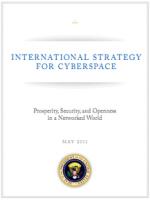
Think Globally, Act Locally: Implications of the International Cyberspace Strategy for Federal Leaders and Managers

On Monday, at an event with the Secretaries of State, Commerce, Homeland Security, the Attorney General, and the Deputy Secretary of Defense, the Obama Administration released its international strategy for cyberspace. The strategy, described in a post from White House Cyber Coordinator Howard Schmidt, for the first time outlines a number of principles that the US will follow in working with international partners to achieve a global internet that promotes innovation and remains safe, secure, and resilient.
At first glance, this strategy would seem to have little bearing on Federal leaders and managers outside a global context. But its content reflects the principles that have made the Internet into what ins increasingly the most effective channel for delivering government programs. Moreover, many programs that have been implemented in a primarily domestic context are now, thanks to the speed of cyberspace and its flow across borders, translating into internationally relevant activity. Even open government and transparency initiatives at the Federal, State, and local level are now being emulated across the globe.
A few specific principles form the strategy illustrate this point:
- Openness -- building on the US open government initiative
- Interoperability -- ensuring that the systems used by the US government can communicate effectively for activity that is increasingly international
- Security -- consistent with the many activities in Congress and the Administration to focus on a secure network
- Reliability -- designing a set of systems that are resilient and durable.
Such principles are not new to US government managers and their industry partners. The Administration's focus on them as core to an international approach reinforces the fact that in cyberspace, domestic action has global impact. Agencies, and businesses who support those agencies, will succeed most by recognizing their import across many areas previously considered "domestic only".



